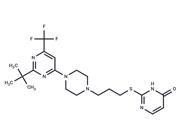| Name | A-1155463 |
| Description | A-1155463, a highly potent and selective BCL-XL inhibitor, shows picomolar binding affinity to BCL-XL, and >1000-fold weaker binding to BCL-2 and related proteins BCL-W(Ki=19 nM) and MCL-1(Ki>440 nM). |
| Cell Research | Cells are treated with increasing concentration of A-1155463. Cells are assayed for viability after 72 h using the CellTiter-Glo luminescent cell viability assay according to the manufacturer's protocol. Results are normalized to cells without treatment. EC50 is calculated using the GraphPad Prism software.(Only for Reference) |
| Kinase Assay | Recombinant p38 isoforms are activated by Mkk6(E) under the following conditions: p38 (100 ng/mL), Mkk6(E) (30 ng/mL), ATP (100 mM) are mixed in kinase buffer (25 mM Hepes, 25 mM b-glycerophosphate, 0.1 mM sodium orthovanadate, 25 mM MgCl2, 2.5 mM DTT, pH 7.4) and incubated for 30 min at 30°C. A typical assay reaction for Mnk1 activity contained Mnk1 (2 ng/mL), HA-eIF4E (10 ng/mL), ATP (300 mM) in kinase buffer. The reaction is started by addition of activated p38 (0.03-3 ng/mL) and stopped after 30 min at 30°C by addition of SDS loading buffer. Inhibitors of Mnk1 are identified under the same assay conditions, except that Mnk1 is pre-activated using active p38a before exposure to the substrate and inhibitors. |
| Animal Research | Animal Models: SCID-Beige MiceFormulation: 5% DMSO, 10% EtOH, 20% Cremaphor ELP, and 65% D5WDosages: 5 mg/kgAdministration: i.p. |
| In vitro | A-1155463 disrupts BCL-XL-BIM but not BCL-2-BIM complexes in cells. A-1155463 kills BCL-XL-dependent Molt-4 cells (EC50=70 nM) but has no measurable cytotoxicity against BCL-2-dependent RS4;11 cells (EC50>5 mM). A-1155463 induces the hallmarks of apoptosis, as evidenced by the release of cytochrome c from mitochondria, caspase activation, and the accumulation of caspase-dependent sub-G0-G1 DNA content in BCL-XL-dependent H146 cells[2]. |
| In vivo | Following a single 5 mg/kg IP dose of A-1155463 in nontumor bearing SCID-Beige mice, platelet counts fall dramatically as measured at 6 h postdose and then rebound to normal levels within 72 h. Daily Dosing at 5 mg/kg IP to SCID-Beige mice that had been inoculated with BCL-XL-dependent H146 tumor cells for 14 days causes a statistically significant inhibition of tumor growth (maximum tumor growth inhibition = 44%), which is alleviated upon cessation of dosing[1]. |
| Storage | keep away from moisture | Powder: -20°C for 3 years | In solvent: -80°C for 1 year | Shipping with blue ice/Shipping at ambient temperature. |
| Solubility Information | DMSO : 100 mg/mL (149.3 mM), Sonication is recommended.
H2O : < 1 mg/mL (insoluble or slightly soluble)
Ethanol : 100 mg/mL (149.3 mM), Sonication is recommended.
10% DMSO+40% PEG300+5% Tween 80+45% Saline : 4 mg/mL (5.97 mM), Sonication is recommended.
|
| Keywords | Inhibitor | inhibit | Bcl-xL | Bcl-2 Family | Bcl-2 | A-1155463 |
| Inhibitors Related | Cyanoacetamide | Ascorbyl palmitate | (S)-(+)-Ibuprofen | Pendimethalin | Amantadine | Hydralazine hydrochloride | Estradiol benzoate | Navitoclax | N-Hydroxyphthalimide | Venetoclax | Benzbromarone | Thymoquinone |
| Related Compound Libraries | Highly Selective Inhibitor Library | Apoptosis Compound Library | Cuproptosis Compound Library | Mitochondrial Membrane Protein-Targeted Compound Library | Bioactive Compound Library | Hematonosis Compound Library | Inhibitor Library | Mitochondria-Targeted Compound Library | Anti-Aging Compound Library | Bioactive Compounds Library Max | Fluorochemical Library | Anti-Cancer Compound Library |

 United States
United States






